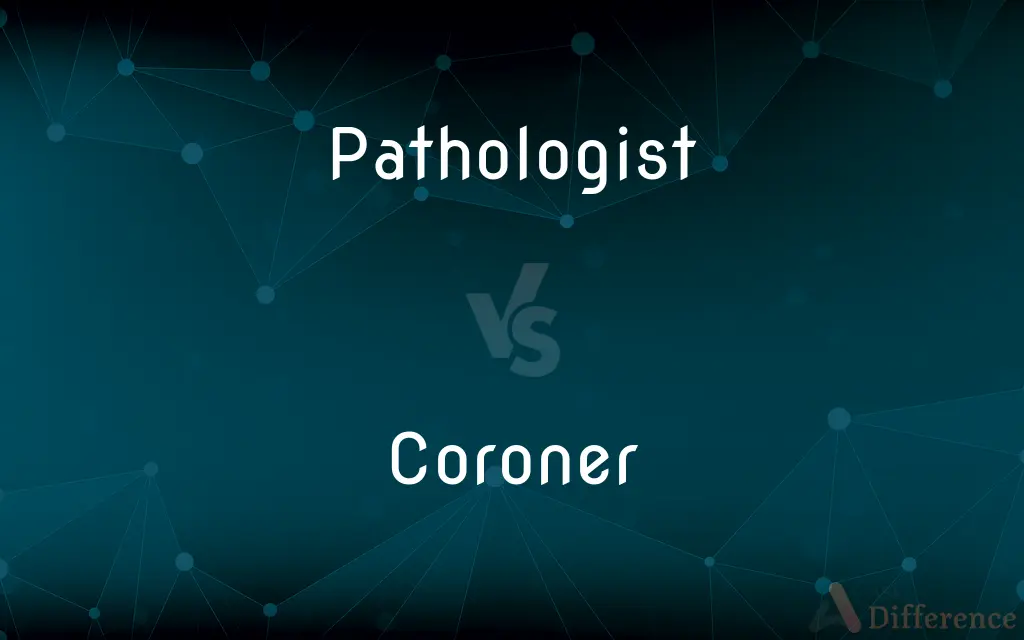Pathologist vs. Coroner — What's the Difference?
By Tayyaba Rehman — Updated on October 29, 2023
A pathologist is a medical doctor who studies diseases and performs autopsies, while a coroner investigates and determines the cause of sudden or unexplained deaths, often without a medical degree.

Difference Between Pathologist and Coroner
Table of Contents
ADVERTISEMENT
Key Differences
Pathologists are specialized medical doctors who diagnose diseases by examining tissues, cells, and bodily fluids, often using laboratory tests. They play an essential role in various medical fields, from confirming cancer diagnoses to performing autopsies to determine causes of death. In contrast, coroners are officials, often elected, who investigate and determine causes of sudden, violent, or unexplained deaths within their jurisdiction.
While the role of a pathologist is primarily medical and diagnostic, a coroner's responsibilities lean more toward the investigative and legal aspects of death. In many jurisdictions, a coroner does not need to possess a medical degree. Their primary goal is to ascertain whether a death was natural, accidental, suicide, or homicide. If required, they can order an autopsy, typically performed by a pathologist.
The intersection between pathologists and coroners often occurs in the realm of forensic science. Forensic pathologists, a sub-specialty of pathology, focus specifically on determining the cause and manner of death, especially in legal contexts. While coroners might oversee or direct such investigations, it's usually the forensic pathologist who conducts the detailed post-mortem examinations.
In essence, while both pathologists and coroners deal with matters of death, their approaches and expertise differ. Pathologists have extensive medical training, emphasizing diagnostics, while coroners often operate from a more administrative or legal standpoint, determining the nature of deaths in their jurisdiction.
Comparison Chart
Primary Role
Diagnoses diseases through tissue and fluid examination
Investigates cause of sudden or unexplained deaths
ADVERTISEMENT
Education
Medical degree
Not always a medical degree
Expertise
Medical and diagnostic
Investigative and sometimes legal
Involvement in Autopsies
Often performs autopsies
Orders autopsies, usually performed by pathologists
Association
Associated with hospitals and medical facilities
Often a public official in a specific jurisdiction
Compare with Definitions
Pathologist
Often involved in autopsy procedures.
The pathologist determined the cause of death after a thorough examination.
Coroner
An official who investigates the cause of unexplained deaths.
The coroner ruled the death as an accident.
Pathologist
Provides essential diagnostic information to treating physicians.
The treatment was modified based on the pathologist's findings.
Coroner
Often an elected or appointed position.
The local community voted in a new coroner last fall.
Pathologist
Crucial in forensic investigations.
The forensic pathologist provided testimony in the murder trial.
Coroner
May not possess a medical degree.
Despite not being a doctor, the coroner had vast investigative experience.
Pathologist
Expert in examining bodily tissues and fluids.
She consulted the pathologist to analyze the tissue samples.
Coroner
Works closely with law enforcement.
The coroner and detectives discussed the case findings.
Pathologist
A medical doctor specializing in the study of diseases.
The pathologist confirmed the biopsy showed signs of cancer.
Coroner
Can order autopsies when the cause of death is unclear.
Given the mysterious circumstances, the coroner ordered an autopsy.
Pathologist
The scientific study of the nature of disease and its causes, processes, development, and consequences. Also called pathobiology.
Coroner
A coroner is a government or judicial official who is empowered to conduct or order an inquest into the manner or cause of death, and to investigate or confirm the identity of an unknown person who has been found dead within the coroner's jurisdiction. In medieval times, English coroners were Crown officials who held financial powers and conducted some judicial investigations in order to counterbalance the power of sheriffs or bailiffs.
Pathologist
The anatomic or functional manifestations of a disease
The pathology of cancer.
Coroner
A public officer whose primary function is to investigate any death thought to be of other than natural causes.
Pathologist
A departure or deviation from a normal condition
"Neighborhoods plagued by a self-perpetuating pathology of joblessness, welfare dependency, crime" (Time).
Coroner
A public official who presides over an inquest into unnatural deaths, and who may have (or historically had) additional powers such as investigating cases of treasure trove.
Pathologist
An expert in pathology; a specialist who examines samples of body tissues for diagnostic or forensic purpose.
Coroner
A medical doctor who performs autopsies and determines time and cause of death from a scientific standpoint.
Pathologist
One skilled in pathology; an investigator in pathology; as, the pathologist of a hospital, whose duty it is to determine the causes of the diseases.
Coroner
(Isle of Man) The administrative head of a sheading.
Pathologist
A doctor who specializes in medical diagnosis
Coroner
An officer of the peace whose principal duty is to inquire, with the help of a jury, into the cause of any violent, sudden or mysterious death, or death in prison, usually on sight of the body and at the place where the death occurred.
Coroner
A public official who investigates by inquest any death not due to natural causes
Common Curiosities
Why would a coroner order an autopsy?
A coroner orders an autopsy when the cause of death is unclear or suspicious.
Can a pathologist determine the cause of death?
Yes, especially forensic pathologists, who specialize in determining causes of death.
Can a coroner perform an autopsy?
Typically, a coroner orders an autopsy which is performed by a pathologist.
Is a coroner always a medical doctor?
No, a coroner isn't always a medical doctor and may not possess a medical degree.
How does a coroner's role differ from a medical examiner?
While both investigate deaths, a medical examiner is typically a physician, whereas a coroner may not be.
What does a pathologist primarily study?
A pathologist studies diseases and diagnoses them using tissue and fluid examinations.
Why is a pathologist's diagnosis crucial for patient care?
A pathologist provides essential diagnostic information, helping treating physicians decide on the best care.
Where do pathologists typically work?
Pathologists often work in hospitals, laboratories, or medical facilities.
Do pathologists and coroners collaborate?
Yes, especially when an autopsy is ordered by a coroner to be performed by a pathologist.
Do pathologists only deal with deceased individuals?
No, pathologists also diagnose living patients by examining tissue samples, biopsies, etc.
How is a coroner's position established?
A coroner is often an elected or appointed position in a specific jurisdiction.
Are all pathologists involved in forensic work?
No, only forensic pathologists specialize in legal contexts of death.
Is a coroner involved in legal proceedings?
Yes, a coroner may be involved in legal processes and provide testimonies in court.
Is pathology limited to human medicine?
No, there are also veterinary pathologists who study diseases in animals.
Share Your Discovery

Previous Comparison
Air vs. Airs
Next Comparison
Cathedral vs. MinsterAuthor Spotlight
Written by
Tayyaba RehmanTayyaba Rehman is a distinguished writer, currently serving as a primary contributor to askdifference.com. As a researcher in semantics and etymology, Tayyaba's passion for the complexity of languages and their distinctions has found a perfect home on the platform. Tayyaba delves into the intricacies of language, distinguishing between commonly confused words and phrases, thereby providing clarity for readers worldwide.
















































